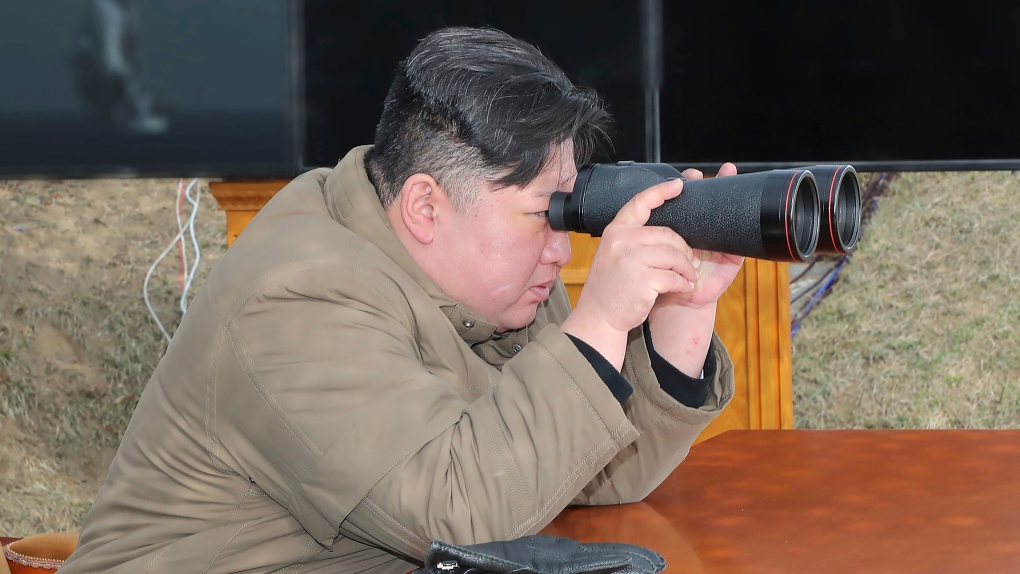SEOUL, South Korea -
North Korea said Friday its cruise missile launches this week were part of nuclear attack simulations that also involved a detonation by a purported underwater drone as leader Kim Jong Un vowed to make his rivals "plunge into despair."
North Korea has stepped up its weapons demonstrations in a tit-for-tat response to military exercises between the United States and its ally South Korea aimed at countering the North's growing nuclear threat. The allies completed an 11-day exercise that included their biggest field training in years on Thursday, but North Korea is expected to continue its weapons tests as the United States reportedly plans to send an aircraft carrier in coming days for another round of joint drills with the South.
Pyongyang's official Korean Central News Agency said Kim supervised a three-day exercise that simulated nuclear counterattacks against enemy naval assets and ports that involved detonations of mock nuclear warheads. KCNA said the drills were aimed at alerting the United States and South Korea of a brewing "nuclear crisis" as they continue with their "intentional, persistent and provocative war drills" the North portrays as invasion rehearsals.
KCNA said the drills verified the operational reliability of an underwater nuclear attack drone the North has been developing since 2012. It said the drone was deployed off the North's eastern coast on Tuesday, travelled underwater for nearly 60 hours and detonated a test warhead at a target standing for an enemy port.
North Korea is believed to have dozens of nuclear warheads and may be capable of fitting them on older weapons systems, such as Scuds or Rodong missiles. However, there are different assessments on how far it has advanced in engineering those warheads to fit on the new weapons it has developed at a rapid pace, which might require further technological upgrades and nuclear tests.
Speaking to lawmakers on Thursday, South Korean Defence Minister Lee Jong-Sup said the North probably hasn't yet mastered the technology to arm its most advanced weapons, although acknowledging that the country was making "significant progress."
"Pyongyang's latest claim to have a nuclear-capable underwater drone should be met with skepticism," said Leif-Eric Easley, a professor at Ewha University in Seoul. "But it is clearly intended to show that the Kim regime has so many different means of nuclear attack that any preemptive or decapitation strike against it would fail disastrously."
On Wednesday, North Korea also test-fired cruise missiles in launches that were detected and publicized by South Korea's military. It also staged another nuclear attack simulation with a short-range ballistic missile on Sunday and flight-tested an intercontinental ballistic missile last week that may be able to reach the continental United States.
KCNA said Wednesday's tests were of four cruise missiles and two different types. The missiles flew for more than two hours in patterns over the sea while demonstrating an ability to strike targets 1,500 kilometres and 1,800 kilometres away. It said the missiles' mock nuclear warheads were detonated 600 meters (1,968 feet) above their targets, which supposedly verified the reliability of their nuclear explosion control devices and warhead detonators.
KCNA said Kim was satisfied with the three-day drills and directed unspecified additional tasks to counter the "reckless military provocations" of his rivals, indicating North Korea will further ramp up its military displays.
Kim "expressed his will to make the U.S. imperialists and the (South) Korean puppet regime plunge into despair" with powerful demonstrations of his military nuclear program to make his rivals understand "they are bound to lose more than they get" with the expansion of their joint drills.
Kim issued similar language Sunday after a test-firing of a short-range ballistic missile from what was possibly a silo dug into the ground. The North's media said a mock nuclear warhead placed on the missile detonated 800 meters (2,624 feet) above water, an altitude that some experts say was aimed at maximizing damage.
It was the first time for North Korea to publicize such an altitude for detonating a nuclear weapon though it has previously claimed to have conducted simulated nuclear strikes on its rivals.
North Korea's report on the drills came as South Korean President Yoon Suk Yeol was preparing to attend a remembrance service to honor 55 South Korean troops who died during major clashes with the North near their western sea border in past years. They include 46 sailors who died during the 2010 sinking of the warship Cheonan, which Seoul blamed on a North Korean torpedo attack, although the North denied involvement.
The North has fired over 20 ballistic and cruise missiles over 10 different launch events this year as it tries to diversify its delivery systems and display a dual ability to conduct nuclear strikes on both South Korea and the U.S. mainland. North Korea already is coming off a record year in testing activity, with more than 70 missiles fired in 2022, as Kim accelerated a campaign aimed at forcing the United States to accept the idea of the North as a nuclear power and negotiating badly needed sanctions relief from a position of strength.
South Korea and the United States have been responding by expanding their joint military exercises that were downsized in previous years. Seoul's Defense Ministry said this week that South Korea and the U.S. are planning to conduct a live-fire exercise that would be "unprecedented" in scale in June.






































